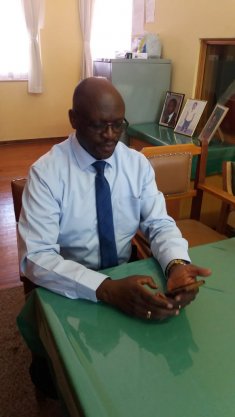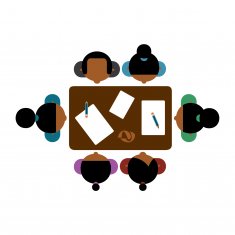
Two education officials explain how their action research changed the way they support school leaders in Free State.
As part of its support to the department of education, VVOB nurtures the supportive role of departmental officials to schools for inclusive education. Support to schools can increase the (perceived) self-efficacy of teachers and school leaders and put ownership of professional development with them. This supportive role of the department requires a partial shift in their role from content experts to facilitators of collaborative and enquiry-based learning.


To nurture this shift, 27 volunteering education officials in Free State province are participating in an action research process which allows them to explore this changing role when they support their teachers and school leaders. Secondly, the action research aims to strengthen inclusive education practices in schools. For a long time, inclusive education was perceived as a specific matter, related to special needs and rooted in a medical model. Gradually, a shift is taking place from this medical model towards a more holistic approach looking at (a combination of) systemic, pedagogical, extrinsic or intrinsic barriers. For an education system to be inclusive, it should adapt to its children rather than the reverse. This relates to attitudes of teachers and school leaders valuing learner diversity in their schools. If such values are missing, the chances that a school is inclusive, and teachers apply an inclusive pedagogy in their classrooms decline.
Mr Mosea and Mr Moletsane are two education officials who volunteered to participate in the action research process. They are both Circuit Managers, meaning they have a role to play to support schools in their circuit and especially towards school leaders. Their aim is to transform their schools into centres of excellence through partially modifying their working approach with school leaders.
The case of Mr Mosea
“I used to be more authoritative in approach. I noticed this in myself – everybody should follow, or else… But through this process, I have researched the impact of a more supportive approach. For example, I used to get results’ data from the online education portal and present them to the entire group of principals. I have changed that approach to having principals present their own results, and also share some of the strategies they used to improve their results. I also engaged my colleagues from the inclusive education section (about strategies to embrace inclusiveness) and ICT section (on the resources available to schools and learners). It was a great experience.
The presentation from inclusive education was amazing, an eye-opener for the principals (the presentation was done by another action researcher from our group – collaboration!). It was also great to have the principals presenting their strategies. I asked participants to document what they take away from the session, and it was really rich. I worked with a group of 35 principals, HODs and educators, and I assisted the principals who presented their results. They were confident when giving the presentation. I also suggested that at school level, it must not be the principal who does the presentation, but someone else of the team. We now have more a culture of helping each other. The principals now feel more empowered – they feel they are principals of their schools.”

The case of Mr Moletsane

“My focus was on assisting my principals on one of the six dimensions of the inclusive education framework*, namely on the aspect of professional development.
I conducted a meeting with all principals of the circuit (a circuit meeting), I issued out an invitation with agenda items. In the meeting, I deviated from the norm of going through the agenda items. I moved from being an expert to being a practitioner. I started with the ‘AOB’. I facilitated the meeting by asking questions of the principals. I started by inviting them to write up their frustrations about areas where they would like support from me as a CM. I was amazed by the range of challenges that they highlighted: vacant positions, using ‘acting’ staff for more permanent posts, disciplinary problems in primary school classes; shortage of work- and textbooks. One of them commented on the support of the CM being too limited.
The lesson that I learnt from that meeting. I was struck by the fact that principals are so much dependent on what their supervisors say, rather than being guided by the policy. They struggle to solve problems, do not trust their own professional judgement.
I went further in the meeting, to ask the principals how they themselves could solve certain issues. What was striking, was that the vast majority of solutions came from within the group of principals, not from me.
I could have provided more time to go deeper into these issues.”
Critical Success Factors
One of the strengths in both cases is that there is a big attitude shift in the way they support school leaders. This shift has led to a shift in attitude of school leaders from perceiving children as the barrier to learning towards the schools bearing a responsibility in adapting to the diverse needs of their children. School leaders are empowered to look for solutions to challenges their schools are facing, rather than diverting from problems. Mr Mosea and Mr Moletsane instilled these mind shifts with their school leaders by modifying their supportive approach. Instead of pointing fingers or coming in as ‘fixers’, they give the opportunity to school leaders to identify their own solutions.
One of the critical factors for the success of the action research is working with volunteering participants. Free State Department of Education officials engage in a yearlong action, reflection, learning and planning cycle which also requires intensive documenting of their learnings. Commitment to this process is crucial to bring about change. The action research started in April 2018. To date, only two participants have dropped out.
A contributing factor to this commitment is for participants to identify a problem of practice which is fully embedded within their daily work practice instead of an add-on to their performance plans. If participants’ cases are rooted within their work practice, additional work load decreases and the impact and sustainability of their action research increases.
The gathering moments, or workshops, during the action research allowed for peer learning, on the level of learning about each other’s reflections and learnings, but also to give input in each other’s cases. Participants come from different directorates with their own expertise: District Management, Curriculum and Inclusive Education. Combining expertise from these different units provides an inclusive lens in the support to schools. In one district, this has resulted in the establishment of a Professional Learning Community that comes together regularly to discuss progress on their different action research topics and to explore opportunities for collaboration in each other’s’ cases.

During the action research, participants are gently pushed out of their comfort zones. Instead of their usual inspector’s role, they are becoming facilitators, instilling collaborative and enquiry-based learning with schools. They are researching and learning on their own role and practice to help educators to come to solutions. Action research questions often start with “How can I…”. Creating a conducive environment for this shift is crucial and requires experienced facilitators. In this action research process, VVOB co-facilitated together with CDRA who has vast expertise with developmental facilitation.




